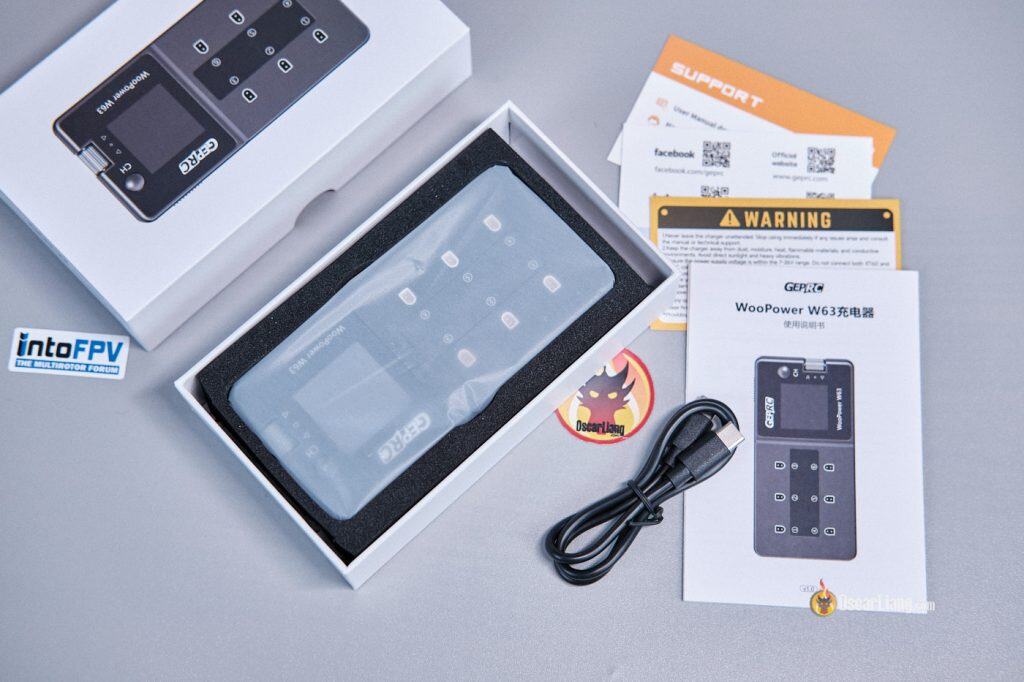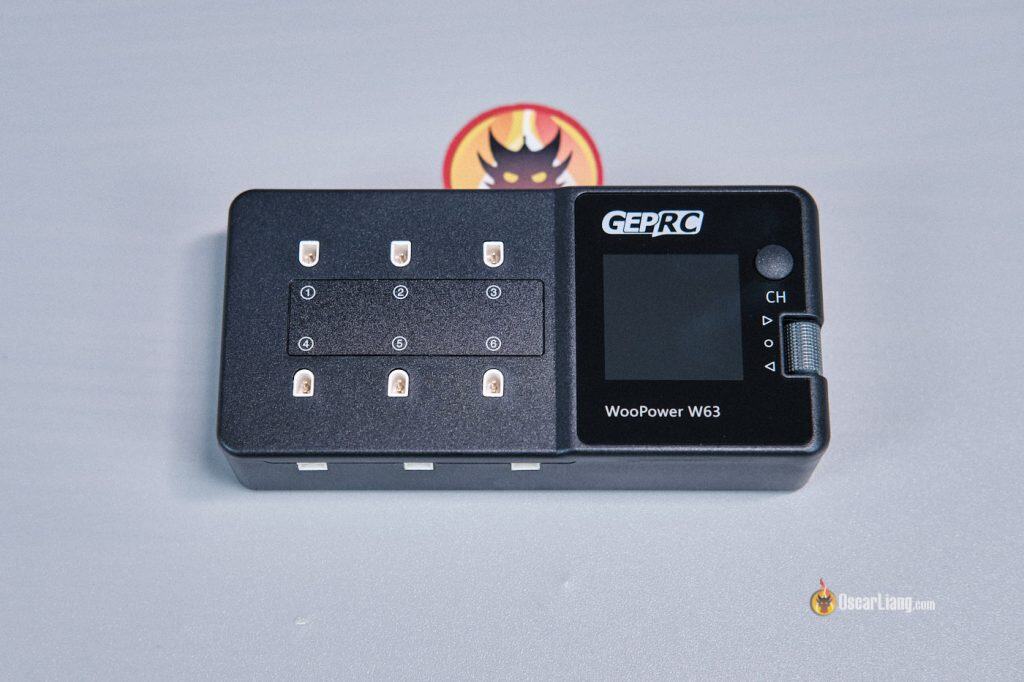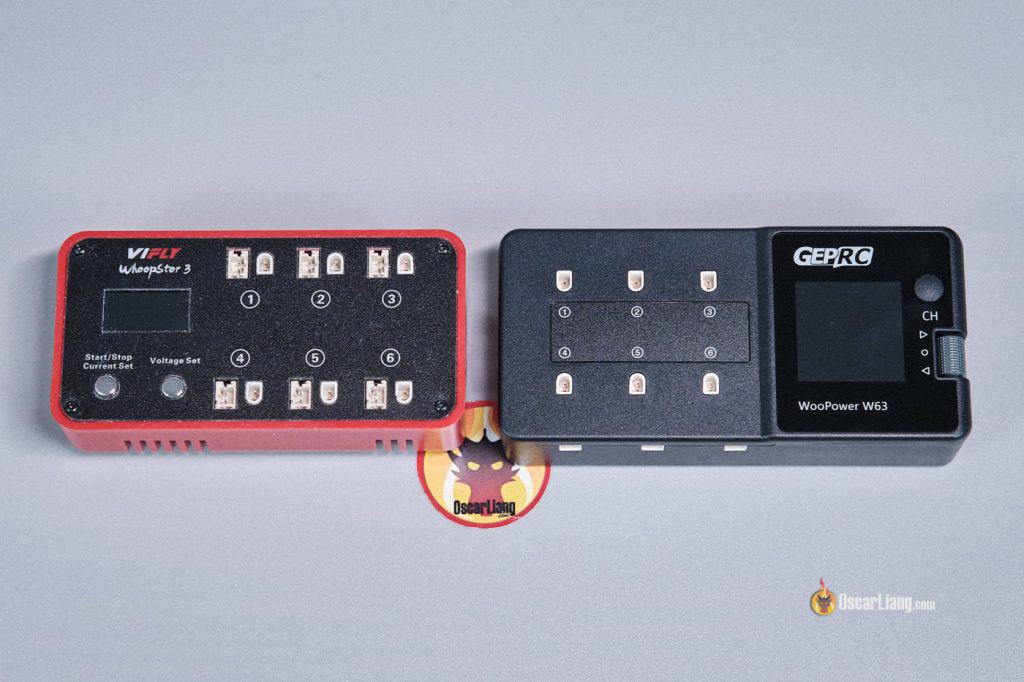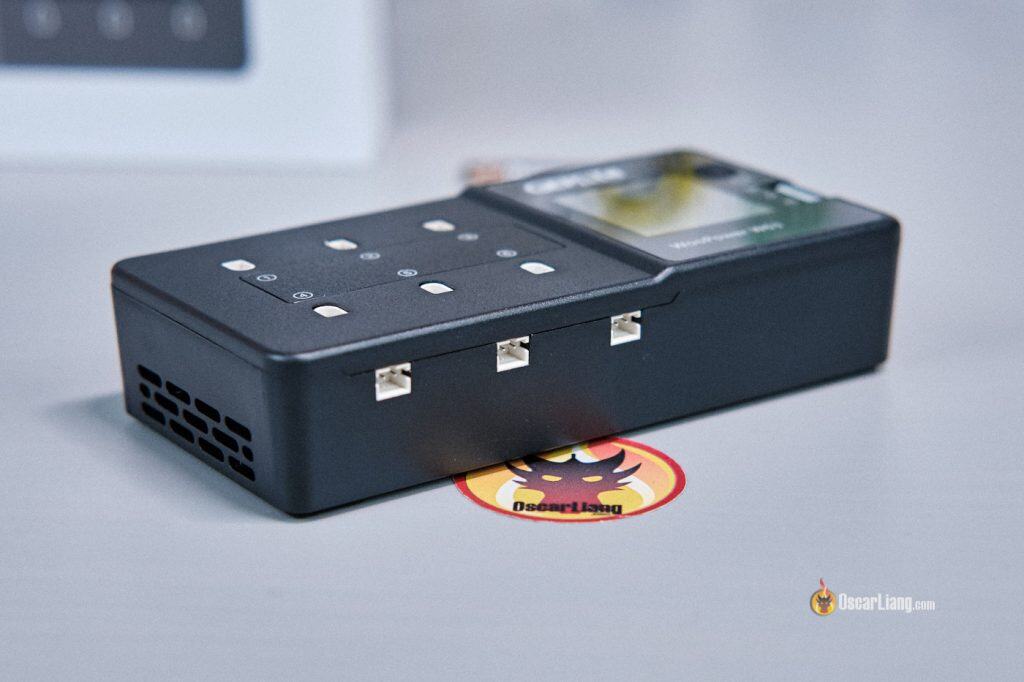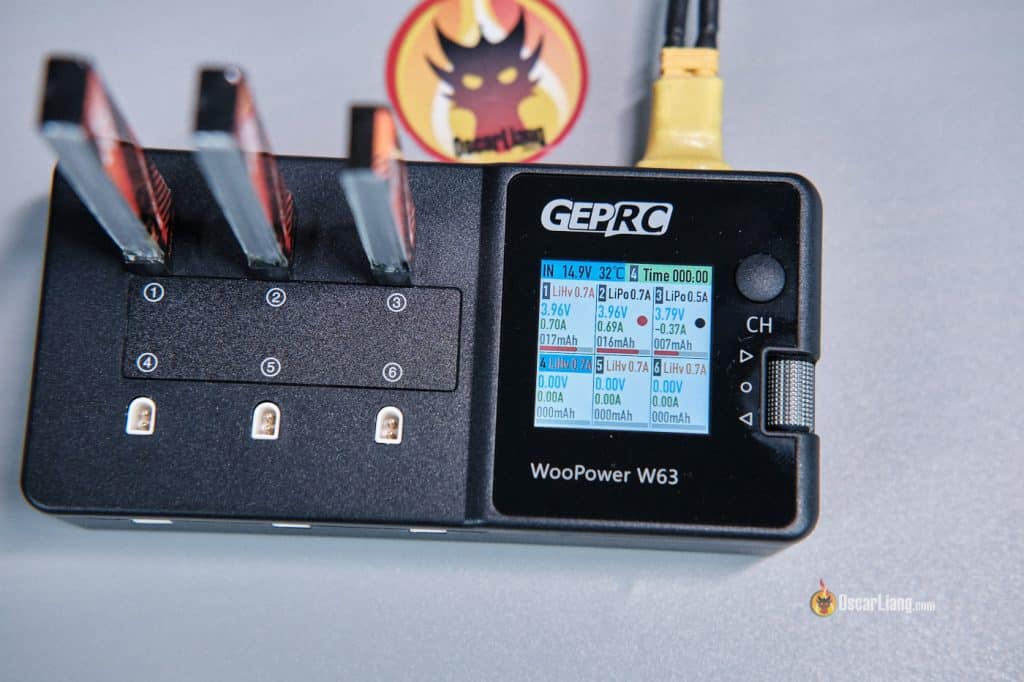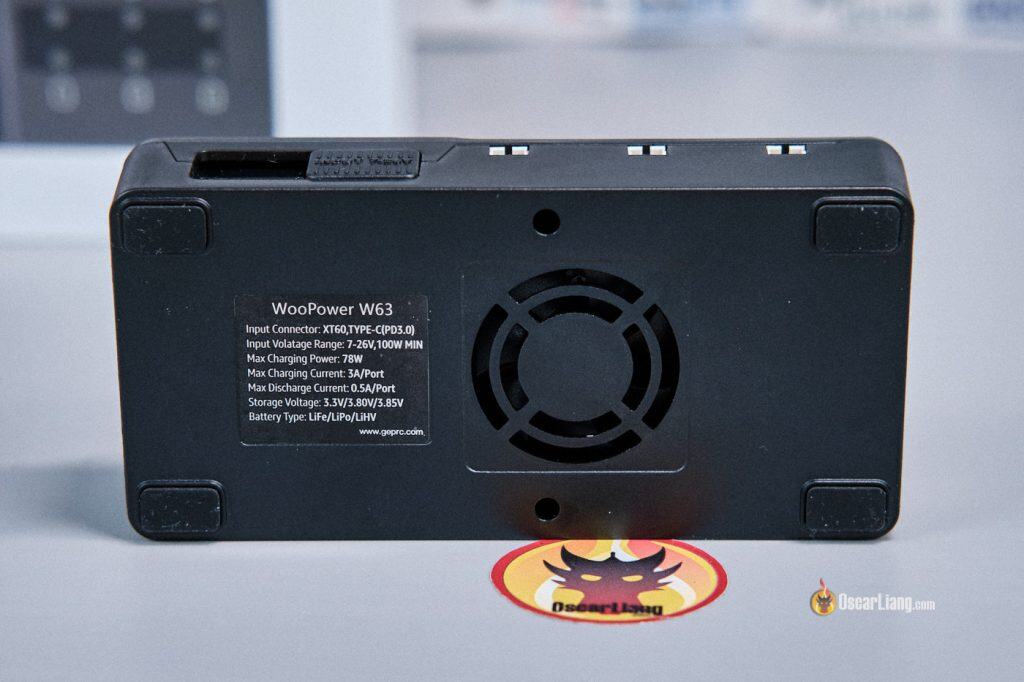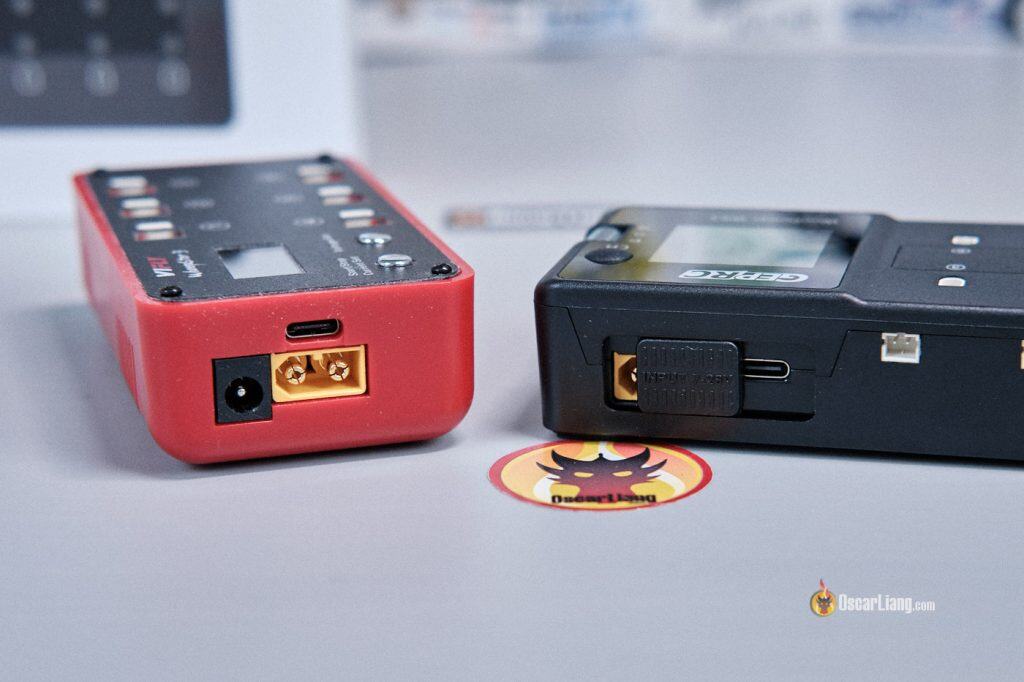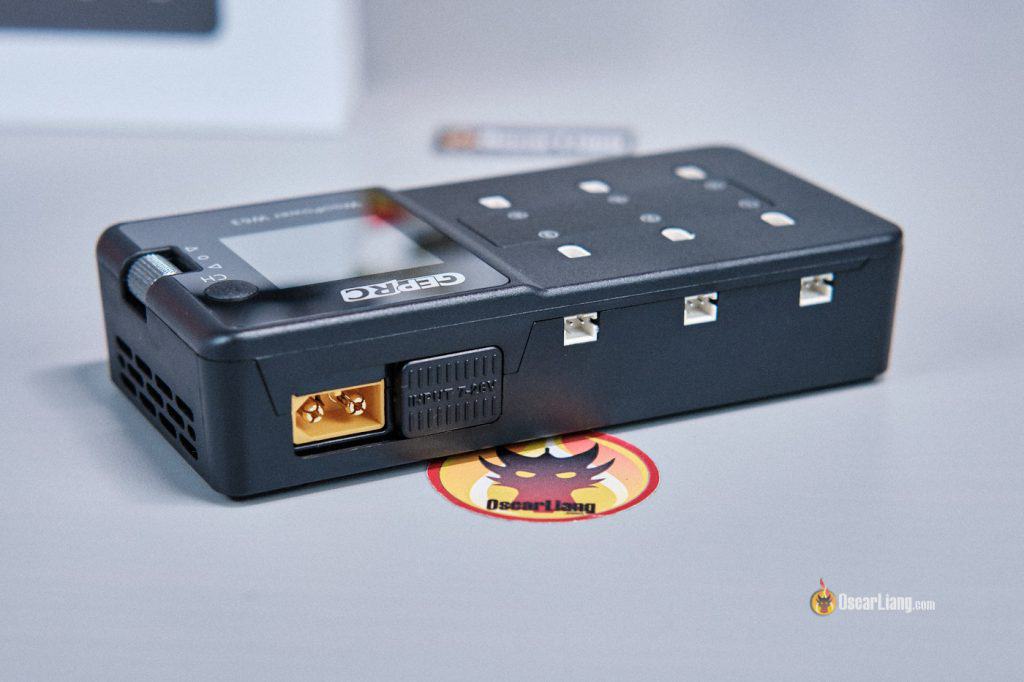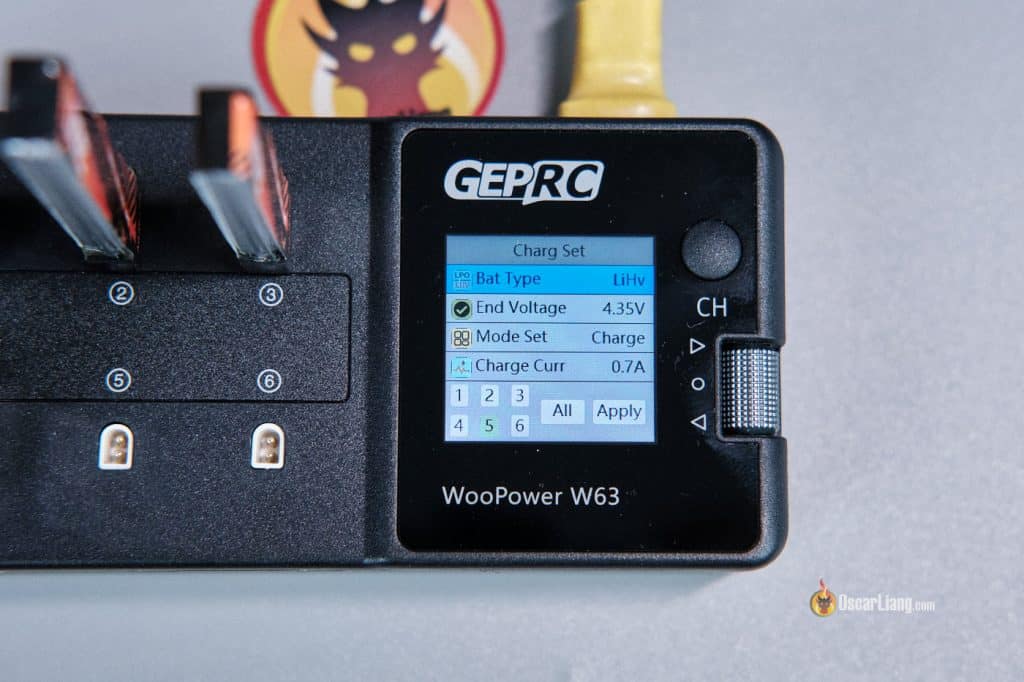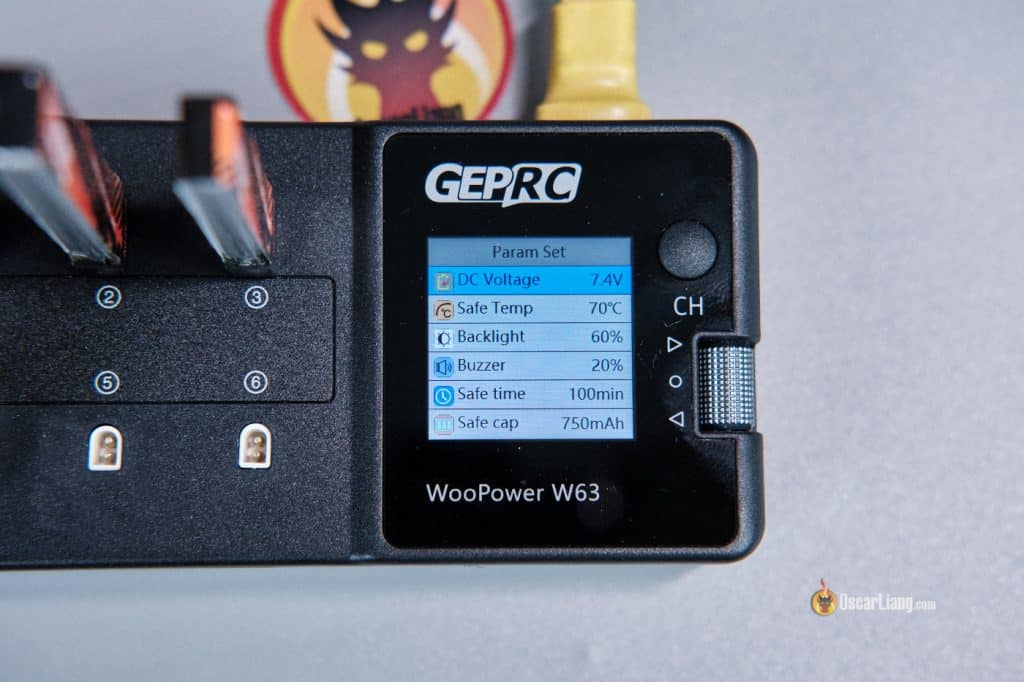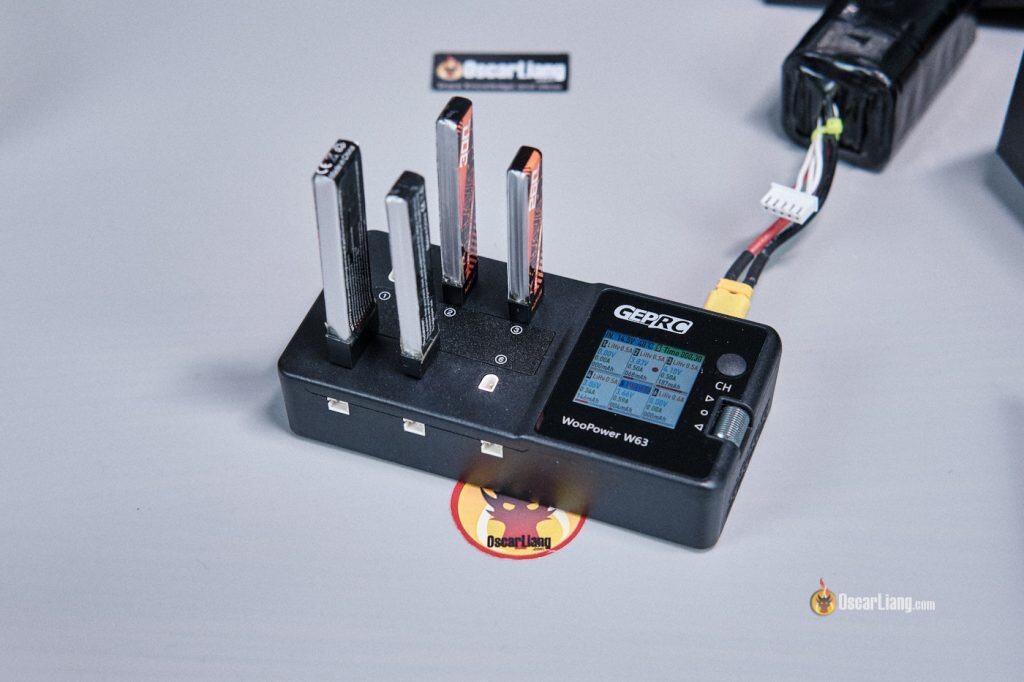After I noticed the discharge of the GEPRC WooPower W63 1S Charger, I used to be instantly intrigued by the specs and knew I had to purchase one to check. Spoiler: I’m impressed—and I consider this could possibly be the brand new king of 1S whoop battery chargers in 2025! With highly effective and versatile efficiency, the WooPower affords six unbiased charging ports, every able to charging as much as 3A. You possibly can concurrently cost, discharge, or storage-charge as much as six 1S batteries, making it extraordinarily handy and environment friendly. On this evaluate, I’ll evaluate the WooPower to the favored Vifly Whoopstor V3, consider how properly it performs, and present you the way it works.
Try my purchaser’s information on Tiny Whoops, associated parts and equipment: https://oscarliang.com/best-tiny-whoop/
The place to Purchase
Get the GEPRC WooPower Charger from:
Within the field:
- WooPower Charger x1
- USB-C to USB-C Cable x1
- Consumer Handbook x1
Specs
- Enter Energy Connectors: XT60 / USB Sort-C (PD 3.0)
- Enter Voltage Vary: 7–26V (2S to 6S)
- Minimal Enter Energy: 100W (for full load)
- Display screen: 1.54-inch IPS show, 240×240 decision
- Output Connectors: 6 unbiased ports, every with PH2.0 and BT2.0 (A30 suitable)
- Max Output Energy: 78W
- Max Charging Present: 3.0A per port
- Max Discharging Present: 0.5A per port
- Working Temperature: 0°C–75°C
- Supported Battery Varieties: 1S LiPo / LiHV / LiFe
- Capabilities: Cost / Discharge / Storage
- Dimensions: 125 x 61 x 28 mm
- Weight: 160g
Design
The Vifly Whoopstor V3 has been my go-to 1S charger for the previous two years—can the GEPRC WooPower lastly dethrone it? Let’s break it down.
At 160g, the WooPower is barely bigger and heavier than the Whoopstor V3 (142g), however this distinction is negligible. Each are compact and travel-friendly, simply becoming right into a gear bag for subject use.
Just like the Whoopstor, the WooPower additionally has 6 charging ports, every that includes PH2.0 and BT2.0 connectors (additionally suitable with A30 batteries).
The place the WooPower shines is its bigger display, which permits it to show extra info directly.
That mentioned, the construct high quality of the Whoopstor feels a bit extra strong and sturdy. The WooPower makes use of barely cheaper and thinner plastic, however until you intend to be tough with it, this shouldn’t be a dealbreaker.
One potential problem with the WooPower is the cooling fan placement—it’s positioned on the underside of the charger. This doesn’t go away a lot room for airflow when it’s sitting flat on a floor. In the event you plan to cost at larger currents, contemplate inserting it on its facet to enhance airflow. GEPRC ought to contemplate relocating the fan to the facet, much like the Whoopstor’s design.
Charging Capabilities
The WooPower boasts a formidable 3A charging present per port, whereas the Whoopstor V3 is restricted to 1.3A. In sensible phrases, 1.3A is already greater than adequate for many tiny whoop batteries—corresponding to 1S 300mAh, 450mAh, and even 550mAh.
If you wish to extend the lifetime of your LiPo batteries, charging at 1C (i.e., charging at a present equal to the battery’s capability) is usually advisable. Which means:
- 300mAh → 0.3A
- 450mAh → 0.45A
- 550mAh → 0.55A
So whereas 3A per port is spectacular, it might be overkill for many customers. That mentioned, should you’re in a rush and select to cost at larger present, ensure to carefully monitor battery temperatures to keep away from overheating or fireplace threat.
Unbiased Charging Ports
One main benefit of the WooPower over the Whoopstor V3 is its unbiased charging ports. On the Whoopstor, charger settings apply globally to all six ports. In distinction, the WooPower means that you can set totally different parameters per port—making it rather more versatile.
For instance, you may:
- Cost 4 batteries at totally different currents
- Discharge a battery
- Put one other into storage cost
All on the similar time.
This degree of management is a large profit when managing batteries of various sizes or sorts, or when flying a number of quads with totally different battery necessities.
Energy Enter Choices
The WooPower will be powered through USB-C (PD 3.0) or an XT60 connector. It doesn’t assist 5521 barrel jack enter just like the Whoopstor, however this probably gained’t be a problem for many customers, as USB-C and XT60 are extra widespread connectors.
As a result of the WooPower helps larger charging currents, it additionally requires the next wattage energy supply to run at full functionality:
- ViFly Whoopstor V3: 40W
- GEPRC WooPower W63: 100W
That mentioned, you may nonetheless use the WooPower with a decrease wattage energy provide—simply scale back the charging present accordingly.
There are a number of methods you may energy the charger, embrace:
- PD energy adapter through USB-C
- Bench energy provide (e.g., ToolkitRC P200)
- Fashionable LiPo chargers with DC output function (12V–24V through XT60)
- 4S or 6S LiPo battery for moveable subject charging
Further Options
GEPRC included plenty of considerate options:
- Charged/discharged mAh show – precisely what number of mAh has been put into the packs, or discharged.
- Enter voltage warning – In the event you’re powering the charger with a battery, it would cease charging and warn you when the enter voltage drops under your set threshold. This helps forestall over-discharging your energy supply.
- Security parameters – You possibly can set limits for charging time, complete capability, and temperature. That is particularly essential when charging at larger currents, serving to to forestall charger overheating or harm.
Tips on how to Use
Relating to charging, the WooPower is simple: merely plug in your battery, and charging begins routinely. Sadly, there’s no button to pause or cease charging—it would solely cease when the battery is totally charged or should you unplug it manually.
If you wish to change charging settings, you will need to accomplish that earlier than plugging within the battery. Use the scroll wheel to pick out the port you wish to configure, then press it to enter the charging settings menu. Navigation is straightforward with the scroll wheel.
You possibly can customise:
- Battery kind
- Charging mode (Cost, Discharge, Storage)
- Present per port
You too can alter the tip voltage:
- For LiPo, from 4.20V to 4.25V
- For LiHV, solely as much as 4.35V
In discharge mode:
- Minimal finish voltage for LiPo: 3.40V
- Minimal for LiHV: 3.50V
You possibly can apply the identical settings to a number of ports, saving effort and time when managing a number of batteries.
Within the System Settings menu (maintain down the CH button), you may alter settings like:
- Show brightness
- Beeper quantity
- Enter voltage warning
- Language
These choices are much like these on a full-featured sensible charger.
Testing
Enter Voltage Measurements
| Voltage (V) | |
| Multimeter | 15.03 |
| Charger | 15.0 |
Port Voltage Measurements
| Voltage (V) | |
| Multimeter | 3.816 |
| Charger Port #1 | 3.82 |
| Charger Port #2 | 3.81 |
| Charger Port #3 | 3.81 |
| Charger Port #4 | 3.82 |
| Charger Port #5 | 3.81 |
| Charger Port #6 | 3.81 |
Finish Voltage When Charging Full
| LiPo (4.20V) | LiHV (4.35V) | |
| Multimeter | 4.182 | 4.318 |
Finish Voltage When Discharging Full
| LiPo (3.40V) | LiHV (3.50V) | |
| Multimeter | 3.440 | 3.489 |
Finish Voltage When Storage Charged Full
| Battery 1 (3.85V) | Battery 2 (3.85V) | |
| Multimeter | 3.826 | 3.817 |
mAh Reporting Accuracy (Charged from 3.2V to 4.35V)
| 1S 260mAh LiHV | 1S 300mAh LiHV | |
| Charger | 267 | 314 |
The testing reveals a really small discrepancy in voltage readings between the charger and my digital multimeter. Nonetheless, it’s minor and never a priority for pastime use. The charger additionally tends to barely undercharge batteries, which isn’t crucial a foul factor, because it’s safer than overcharging. It’s very near the goal voltage anyway.
As for mAh reporting, the readings are typically overestimated by about 3% to 4%, not ideally suited and I want there’s a solution to calibrate it.
Downsides
Discharging is kind of sluggish – Solely goes as much as 0.4A per port, not 0.5A as claimed within the specs.
Moreover, the discharge doesn’t appear to work when batteries are at full cost (i.e. 4.35V). I needed to discharge the battery barely under 4.35V with a quad earlier than the charger begins discharging. This could possibly be a bug.
Ultimate Ideas and Suggestions
Each the ViFly Whoopstor V3 and the GEPRC WooPower W63 are wonderful 1S battery chargers. Nonetheless, the WooPower W63 has now changed the Whoopstor V3 as my go-to 1S charger. It’s extra highly effective, versatile, and contains superior options like:
- Individually controllable ports
- Security options like enter voltage, charging time and temperature warnings
- mAh monitoring
All of this, at a worth level akin to the Whoopstor, makes it a standout possibility in 2025.
That mentioned, should you already personal a Whoopstor V3 and are happy with it, there’s no pressing want to modify. It’s nonetheless a strong, dependable charger, particularly should you primarily cost one kind of battery.
Nonetheless, should you’re out there for a brand new 1S charger, otherwise you need extra management and comfort, the WooPower W63 is totally my best choice.


